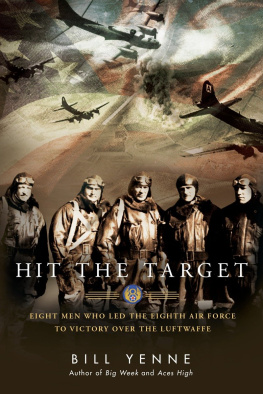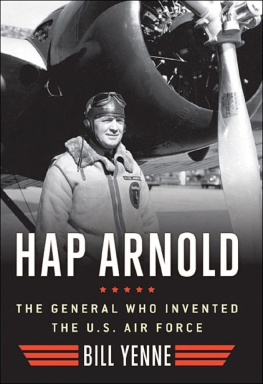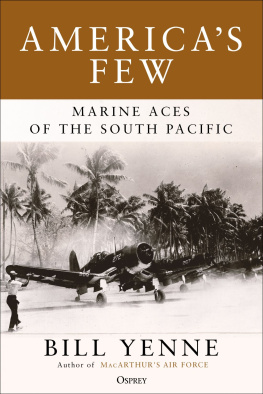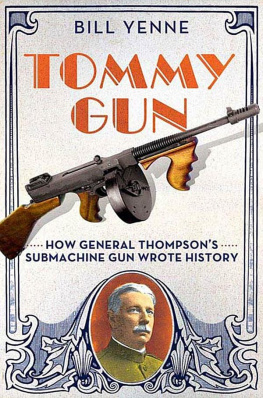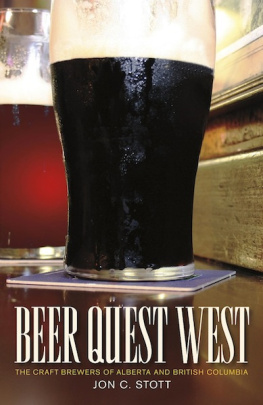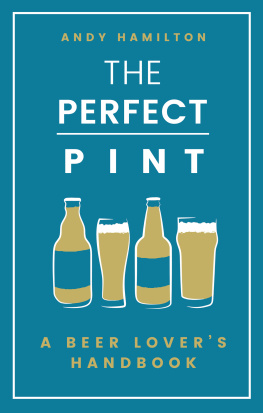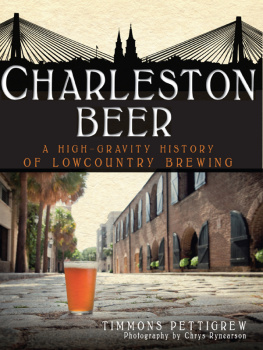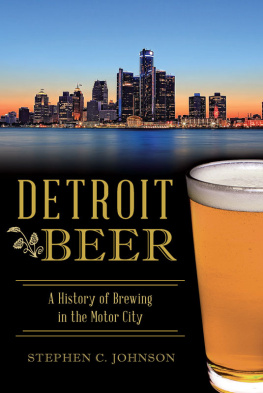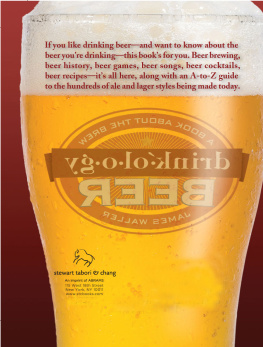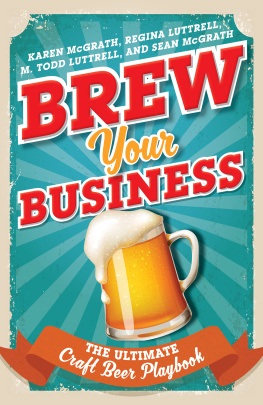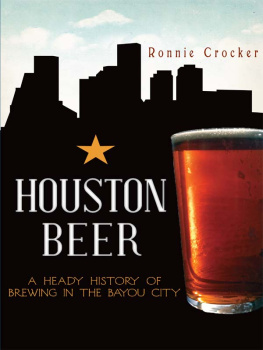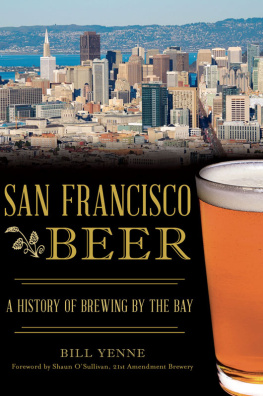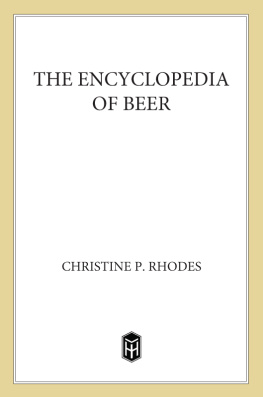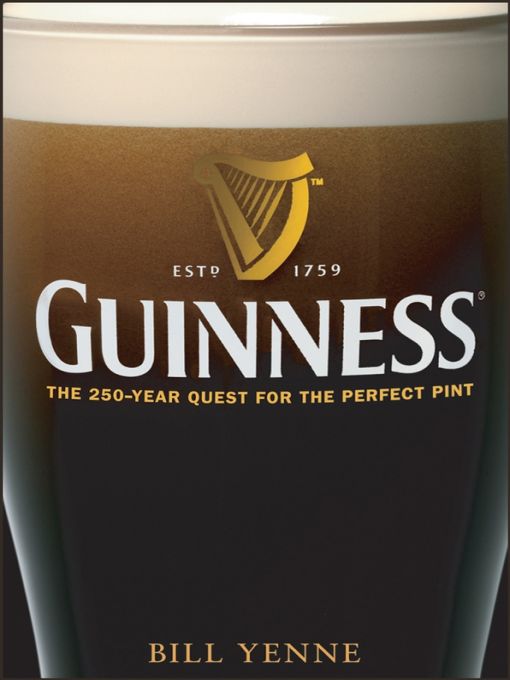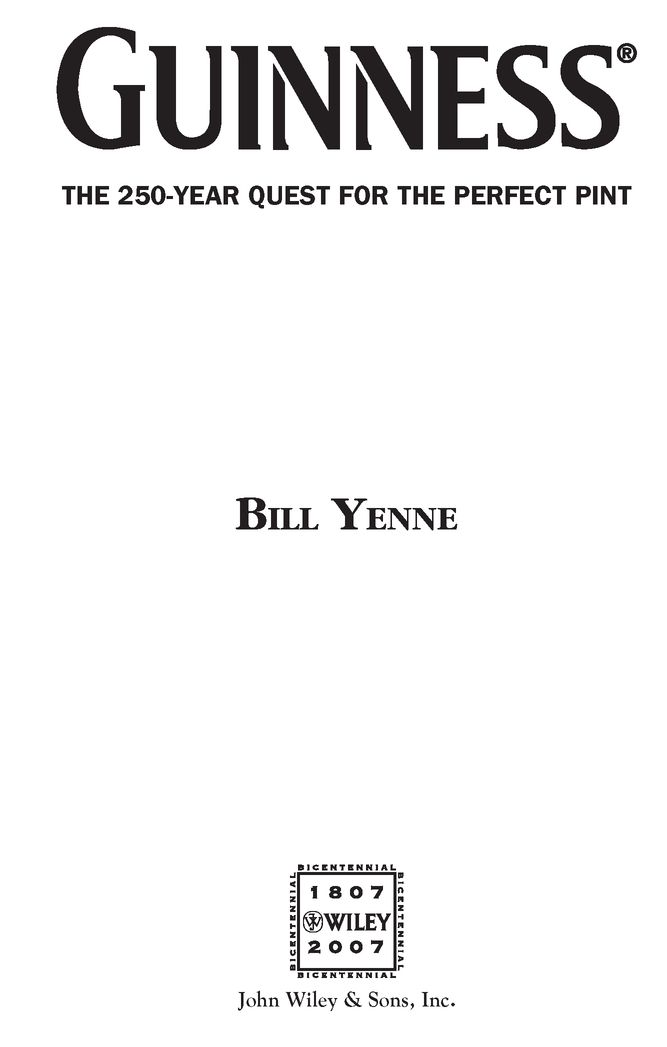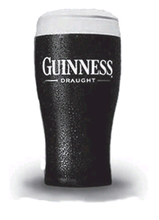Table of Contents
At the pub on the crossroads theres whiskey and beer
Theres brandy and cognac thats fragrant but dear
But for killing the thirst and for easing the gout
Theres nothing at all beats a pint of good stout!
Some folk oer the water think bitter is fine
And others they swear by the juice of the vine
But theres nothing thats squeezed from the grape or the hop
Like the black liquidation with the froth on the top!
from the Irish folk song, Drink It Up Men
Fanny ate a whole fowl for breakfast, to say nothing of a tower of hot cakes.
Belle and I floored another hen betwixt the pair of us, and I shall be no sooner
done with the present amanuensing racket than I shall put myself outside a pint
of Guinness.
Robert Louis Stevenson (letter from Samoa, February 19, 1893)
Dear Jack, this white mug that with Guinness I fill,
And drink to the health of sweet Nan of the Hill,
Was once Tommy Tosspots, as jovial a sot,
As eer drew a spigot, or draind a full pot
In drinking all round twas his joy to surpass,
And with all merry tipplers he swiggd off his glass.
William Makepeace Thackeray (from Burlesques, 1880)
Thats why people look for that Holy Grail of the perfect pint. They come to
Ireland looking for the best pint. People are always looking for that. Even Im
looking for that perfect pint. Thats why Guinness is such a legend.
Guinness Master Brewer Fergal Murray
Notes on Measurements and Terminology
For historic purposes, volume measurements are stated in the unit of measurement used at the time. S. R. Dennison and Oliver MacDonagh of Cork University Press note that Guinness measured beer in hogsheads consisting of 52 imperial gallons and barrels consisting of 32 gallons before 1881 and 36 gallons thereafter. An imperial gallon is equal to 1.2 U.S. gallons. By comparison, U.S. barrels (when used as a form of measurement) contain 31 U.S. gallons. A U.S. gallon is equal to hectoliters.
Currency figures are generally given in British Pounds Sterling, the form of currency in which the data was originally calculated. In 1900, a pound was worth $4.85 in then-current U.S. dollars, and in 1939 (on the eve of World War II), it was $4.00. In 1950, a pound was worth about $2.80 and, in 1980, it was worth about $2.22. In 2000, a pound was equal to $1.45 and at press time it was around $2.00. According to the Consumer Price Index tables developed by Robert Sahr at Oregon State University, adjusted for in inflation, a U.S. dollar at press time would have been worth $0.04 in 1900, $0.07 in 1939, $0.12 in 1950, $0.41 in 1980, and $0.85 in 2000.
As for terminology, this book, though mainly researched in Ireland, was written in the United States. Therefore, the spelling conventions are consistently American with the exception of the Anglo-Irish word draught, which Americans spell draft. The term draught is part of a Guinness product variant name, therefore, we have used the Anglo-Irish spelling throughout for the sake of consistency, capitalized or not. The product name now written as Guinness Draught was once written as Draught Guinness, but we have used the current term Guinness Draught throughout for the sake of consistency.
Acknowledgments
Thanks to the people without whom this book would not have been possible, especially Master Brewer Fergal Murray. Thanks are also due Guinness Archivist Eibhlin Roche, for giving me access to many original documentsand moreand for her patience in working with me and answering my myriad questions. Special thanks also to Rhonda Evans for facilitating my research work in Ireland, to Matt Holt for believing that this book was important, and to John Coakley, who doesnt know that without him, this book would not have happened as it did. Thanks also to the beautiful ladies who have traveled with me through Ireland, Carol, Azia, and Lisa; and all the people with whom I have shared a pint at Vince Hogans pub, including Mike, J. R., Dan, Nick, Todd (with whom I have also enjoyed some wonderful road trips involving quests for perfect pints), and Tom, who long ago helped infuse in me a passion for Guinness.
Prologue: The Worlds Greatest Beer
Surely this is hyperbole!
How can there be such a thing as the worlds greatest beer?
I believe there can be, and I believe that this is it.
Even those who would quibble with such an assertion will agree that Guinness has a place of prominence among the pantheon of the worlds greatest beers. As we hear in the folk song, theres nothing thats squeezed from the grape or the hop like the black liquidation with the froth on the top.
Indeed. There is nothing quite like it.
In more than two decades of writing about beer and brewing history, Ive been asked countless times to name the best beer, or my favorite beer. Ive even been guilty of asking those impossible questions a time or two myself. The easy answer, and an answer often given, is the beer I have in my hand at the moment. For me, such an answer is usually not a flippant one because, wherever I go, I seek out the local brew, and the local brew usually has two of the characteristics most desirable in a beer: It is the work of a local craftsman who takes pride in hisor often hercraftsmanship, and it is fresh.
A global search for the best beer is a moving target. It is always qualified by freshness and many other factors, especially craftsmanship. The best beer is many beers. It might be a glass of Anchor Steam in Fritz Maytags wonderful brewery on Potrero Hill. It might be an astounding farmhouse brew or an exquisite Trappist monastery ale, sipped at their sources in Belgium. Or, of course, it may well be a pint of Guinness poured in Dublin itself, or at a pub called the Dubliner that may be five or ten thousand miles from the Emerald Isle.
A global search for greatness begins on the never-ending road to the best beers, for no beer can be great without also having earned a place among the best. But greatness is derived from many sources. For Guinness, this includes its passionate following who sip the two billion pints that are poured and enjoyed around the world each year. No other beer with a flavor profile so complex and so rewarding is enjoyed by so many people in so many placesin at least 150 countriesaround the world.
While deriving greatness from its truly global charisma, Guinness also derives greatness from its unique sense of place. No other brand of such wide appeal is more endowed with roots that extend so deeply into its native soil. The Irish write folk songs about Guinness. James Joyce mentions it dozens of times.
Meanwhile, no other beer with such a complex and rewarding flavor profile has been enjoyed for so long. The greatness of Guinness comes also from a history that stretches back across


